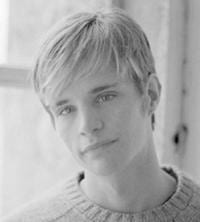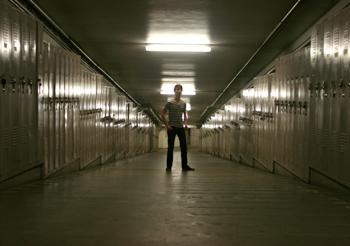
Matthew Shepard.
It’s not often you hear a theatre director tell an actor to get back in the closet. But Emma Hooper Brooks, who is at the helm of Ottawa’s Red Collective, finds herself doing just that on a daily basis.
For its version of The Laramie Project, the company has chosen SAW Gallery’s tiny club space as the venue. The lack of wings means actors are literally entering and exiting from a closet located just off the tiny stage.
“It’s a running joke we have in rehearsal,” she laughs. “There have been certain challenges in working outside a conventional theatre space, but it also brings a new dimension to the work. We use all corners of the room, so the audience is literally engulfed by the play. It can make things uncomfortable in some of the piece’s more challenging moments, but that’s part of the point. The issues we’re dealing with are things people may want to ignore or pretend aren’t there. With this production, you can’t look away because it’s happening all around you.”
Originally created by Moisés Kaufman and the Tectonic Theater Project, the play explores the murder of Matthew Shepard, the young gay Wyoming man who was beaten, tied to a fence and left to die in one of America’s most famous hate crimes. Created by the company through a lengthy series of interviews with the people of Laramie, religious leaders and Shepard’s family, the documentary theatre project has been performed widely since it premiered in 2000. Red Collective is not specifically a queer company, but Hooper Brooks says the team had its own set of reasons for producing the play.
“We were drawn to the play because it was originally created by a collective process,” she says. “We’re also a collective, so the spirit of the original production really embodied who we are. It also ended up being an unfortunately timely production for Ottawa.”
The recent suicide of Jamie Hubley, the Ottawa teen who took his life in October after years of bullying, demonstrates the currency of the play’s core issues. Though the play centres on a murder, it makes it clear that violence is not only physical. For instance, the impact of verbal assault is raised in a scene in which two members of the company interview Father Roger Schmidt, who held the vigil for Shepard after his death.
“In the script they say that calling someone a fag or a dyke is the seat of violence,” Hooper Brooks says. “That’s where it all starts, and that’s the kind of language and behaviour we need to address. Jamie was so brave for being able to stand out and own who he was, but he paid a price for it. I’m straight, but I’m a ginger and I grew up being bullied for having red hair. This behaviour has to stop.”
Though it was not originally part of the plan, in the wake of Hubley’s death the company felt compelled to bring their message more directly to high school students. After they complete the run at SAW, they’ll be moving the production to Glebe Collegiate Institute to perform for local students. Produced numerous times in schools throughout its history, Laramie has often stirred up controversy, and in some cases, the production was cancelled. But Hooper Brooks and the company are hopeful they’ll have the chance to spread their message broadly.
“Some of the language and the subject matter is a little intense, so we’ll have to clear it with the various schools coming to the production,” she says. “It’s strange that school officials are afraid for kids to hear words like faggot and queer onstage, when they’re saying worse things to each other in the halls. But we’re hoping the piece can further the dialogue around these issues and help people to understand the importance of things like gay-straight alliances and anti-bullying campaigns.
“No matter your stance on gay issues, it’s a difficult play to digest,” she adds. “It often scares people because it taps into their existing homophobia. People might think they are fine with gays, but the play often shows them they aren’t as tolerant as they think. We like to think this kind of thing couldn’t happen in Ottawa. But gay teenagers being bullied into taking their own lives is another form of homophobic violence.”


 Why you can trust Xtra
Why you can trust Xtra


